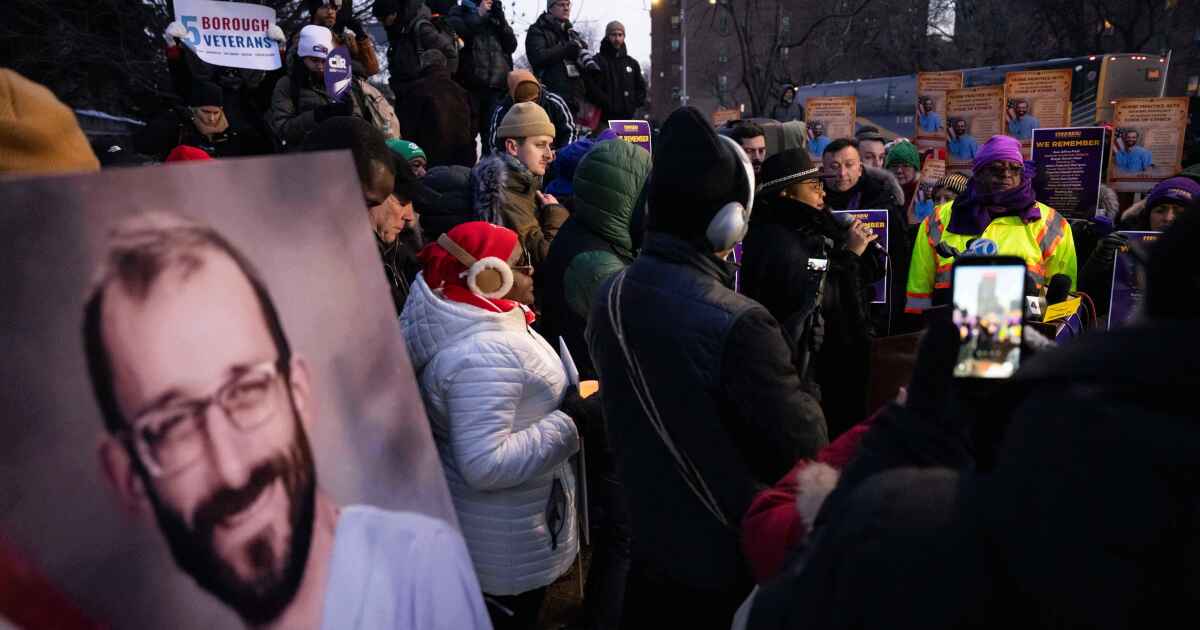DOJ has opened a federal civil rights probe into the death of Alex Pretti, deputy AG says
WASHINGTON — The Justice Department has opened a federal civil rights investigation into the shooting of Alex Pretti, the Minneapolis resident killed Saturday by Border Patrol officers, federal officials said Friday.
“We’re looking at everything that would shed light on what happened that day and in the days and weeks leading up to what happened,” Deputy Attorney General Todd Blanche said during a news conference. “That’s like any investigation that the Department of Justice and the FBI does every day. It means we’re looking at video, talking to witnesses, trying to understand what happened.”
There are thousands of instances every year when someone is shot by law enforcement, Blanche said, but not all are investigated by federal authorities.
“There has to be circumstances or facts or maybe unknown facts, but certainly circumstances, that warrant an investigation,” he added.
The Department of Homeland Security also said Friday that the Federal Bureau of Investigation will lead the federal probe.
Homeland Security Secretary Kristi Noem first disclosed the shift in which agency was leading the probe during a Fox News interview Thursday evening. Her department said earlier this week that Homeland Security Investigations, a unit within the department, would be heading the investigation.
“We will continue to follow the investigation that the FBI is leading and giving them all the information that they need to bring that to conclusion, and make sure that the American people know the truth of the situation and how we can go forward and continue to protect the American people,” Noem said, speaking to Fox host Sean Hannity.
Homeland Security spokesperson Tricia McLaughlin confirmed Friday that the FBI will lead the Pretti probe and that HSI will support them. Separately, Customs and Border Protection, which is part of DHS, is doing its own internal investigation into the shooting, during which two officers opened fire on Pretti.
DHS did not immediately respond to questions about when the change was made or why. The FBI did not immediately respond to a request for comment.
It was also not immediately clear whether the FBI would now share information and evidence with Minnesota state investigators, who have thus far been frozen out of the federal probe.
In the same interview, Noem appeared to distance herself from statements she made shortly after the shooting, claiming Pretti had brandished a handgun and aggressively approached officers.
Multiple videos that emerged of the shooting contradicted that claim, showing the intensive care nurse had only his mobile phone in his hand as officers tackled him to the ground, with one removing a handgun from the back of Pretti’s pants as another officer began firing shots into his back.
Pretti had a state permit to legally carry a concealed firearm. At no point did he appear to reach for it, the videos showed.
“I know you realize that situation was very chaotic, and that we were being relayed information from on the ground from CBP agents and officers that were there,” Noem said during the interview with Hannity on Thursday. “We were using the best information we had at the time, seeking to be transparent with the American people and get them what we knew to be true on the ground.”
The change comes after two other videos emerged Wednesday of an earlier altercation between Pretti and federal immigration officers 11 days before his death.
The Jan. 13 videos show Pretti in a winter coat, yelling at federal vehicles and at one point appearing to spit before kicking out the taillight of one vehicle. A struggle ensues between Pretti and several officers, during which he is forced to the ground. Pretti’s winter coat comes off, and he either breaks free or the officers let him go and he scurries away.
When he turns his back to the camera, what appears to be a handgun is visible in his waistband. At no point do the videos show Pretti reaching for the gun, and it is not clear whether federal agents saw it.
Steve Schleicher, a Minneapolis-based attorney representing Pretti’s parents, said Wednesday the earlier altercation in no way justified officers fatally shooting Pretti more than a week later.
In a post on his Truth Social platform early Friday morning, President Trump suggested that the videos of the earlier incident undercut the narrative that Pretti was a peaceful protester when he was shot.
“Agitator and, perhaps, insurrectionist, Alex Pretti’s stock has gone way down with the just released video of him screaming and spitting in the face of a very calm and under control ICE Officer, and then crazily kicking in a new and very expensive government vehicle, so hard and violent, in fact, that the taillight broke off in pieces,” Trump’s post said. “It was quite a display of abuse and anger, for all to see, crazed and out of control. The ICE Officer was calm and cool, not an easy thing to be under those circumstances!”
Biesecker and Santana write for the Associated Press. AP reporters Alanna Durkin Richer and Eric Tucker contributed to this report from Washington.
